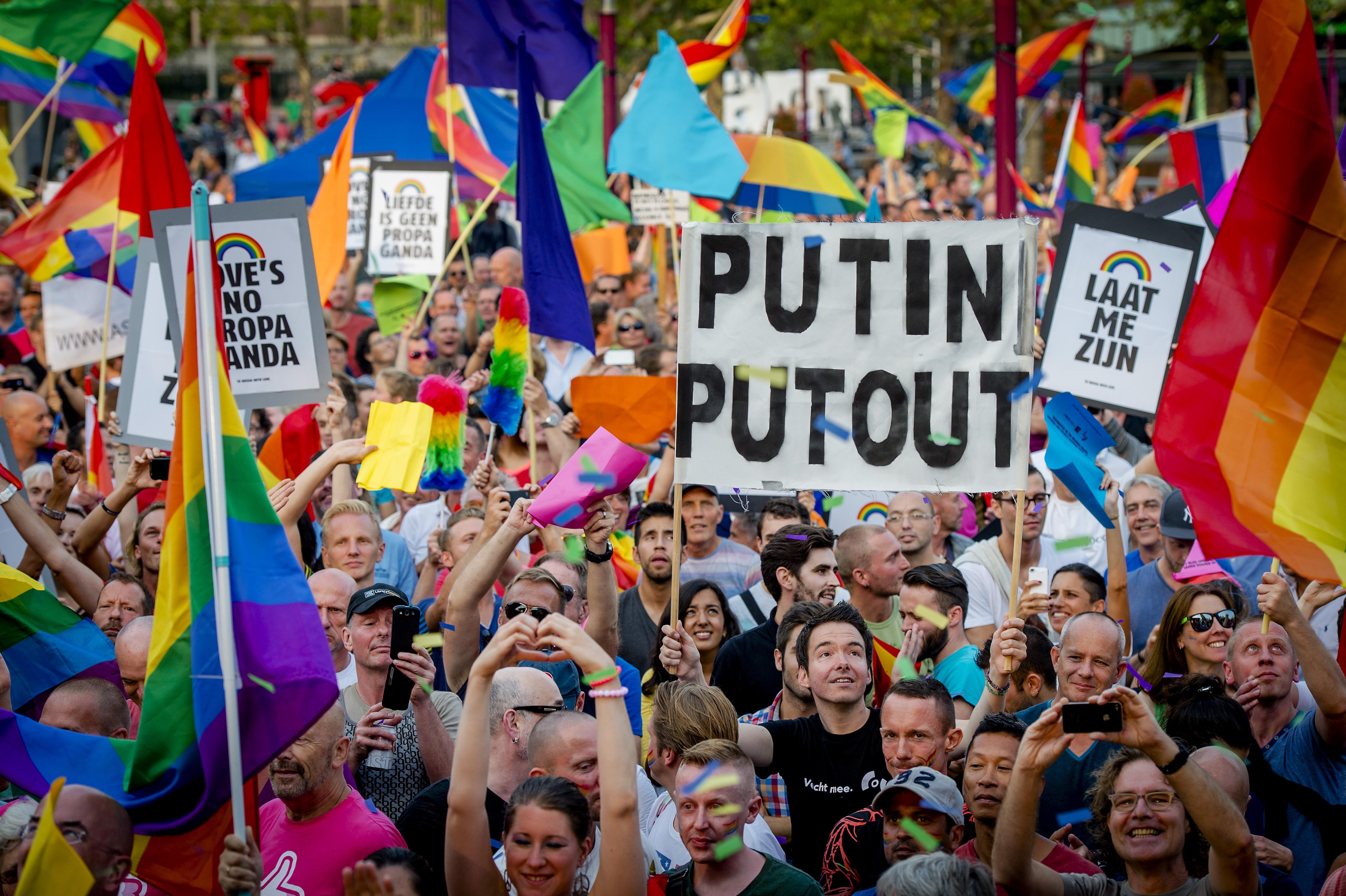As the 2014 Sochi Winter Olympics draw closer, Russia’s new “homosexual propaganda” law—which threatens openly gay people and their allies with imprisonment—continues to stir controversy. And even as Russia insists pro-gay groups are battling an imaginary enemy, its recent actions suggest the country’s reactionary forces are raring for a showdown.
On the Russian front, Russian President Vladimir Putin seems to be taking advantage of his consolidated power to stack the deck against pro-gay protesters. Last Friday, Putin effectively forestalled any demonstrations at Sochi, creating a heavily armed “forbidden zone” around the resort from Jan. 7 to March 21, apparently designed to keep out both would-be terrorists and dissenting viewpoints. And just in case anyone doubted Putin’s dedication to stifling both opposition and sexual expression, on Monday the Russian police confiscated a painting in St. Petersburg that depicted the Russian president clad in lingerie and caught in an intimate pose with Prime Minister Dmitry Medvedev.
Meanwhile, Russian Deputy Prime Minister Dmitry Kozak has assured the International Olympic Committee that the anti-gay law is not, in fact, anti-gay. Kozak claims that because “these legislations apply equally to all persons, irrespective of their … sexual orientation,” they can’t be viewed as “discrimination based on sexual orientation.” This, of course, is pure nonsense; as many have pointed out, the “homosexual propaganda” law actively prohibits gay people from expressing a fundamental component of their identity or publicly embracing a same-sex partner.
The IOC seems to have accepted Russia’s argument, however, noting that Rule 50 of the Olympic Charter already proscribes any “demonstration or political … propaganda” and suggesting that being openly gay amounts to a political demonstration. In response to the IOC’s dodges and equivocations, many in the human-rights community have begun to protest not only Russia’s laws but also the IOC’s perceived “leadership vacuum.” Meanwhile, rumblings of a Sochi boycott are only growing louder, though NBC—which owns the exclusive rights to broadcast the games in the United States—has thus far insisted that the show will go on.
On the gay rights front, several high-profile athletes, gay and straight, have publicly objected to the law. Openly gay figure skater Johnny Weir has stated that he’s prepared to be arrested for wearing a rainbow flag pin during the games, as has New Zealand speed skater Blake Skjellerup. During qualification rounds in the World Athletics Championships in Moscow, Swedish high jumper Emma Green Tregaro painted her nails in rainbow colors to protest the law. (Swedish sprinter Moa Hjelmer followed her lead.) And Belle Breckhoff, an Australian snowboarder and Olympic contender, has come out in advance of the games in order to raise awareness of the controversy. (Russian pole vaulter Yelena Isinbayeva, on the other hand, has loudly defended her country’s anti-gay laws.)
What’s the next move? On Sept. 3, gay rights group All Out is promoting a “Global Speak Out Day” against Russia’s anti-gay law, including protests at Russian embassies and consulates and in city centers. (The group earlier acquired more than 320,000 signatures demanding that the IOC denounce the Russian law.) And many in the media are urging action from the IOC and from Russia. One particularly intrepid reporter, James Kirchick, even hijacked a segment on RT (formerly Russia Today), enjoining the network to provide better coverage of the controversy.
RT—which has run articles like “Russia’s ‘gay propaganda’ law causes outrage abroad but finds support at home”—naturally denied any bias, much like Russia itself denies any homophobic intentions. The country’s mask of tolerance, though, slips further and further each day: Recently, a senior Russian MP announced that gay men will soon be banned from donating blood—though they will be offered free “conversion” therapy to heterosexuality.
We’ll be bringing further updates on Sochi and Russia as news happens.
